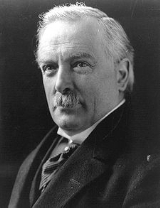
, PC
(17 January 1863 – 26 March 1945) was a British
Liberal
politician and statesman. He was Prime Minister of the United Kingdom
at the head of a wartime coalition government between the years 1916–22 and was the Leader of the Liberal Party from 1926–31.
During a long tenure of office, mainly as Chancellor of the Exchequer
, he was a key figure in the introduction of many reforms which laid the foundations of the modern welfare state
.
The House of Lords is not the watchdog of the constitution; it is Mr Arthur Balfour|Balfour’s poodle. It fetches and carries for him. It barks for him. It bites anyone that he sets it on to.![]()
The Landlord is a gentleman ... who does not earn his wealth. He has a host of agents and clerks that receive for him. He does not even take the trouble to spend his wealth. He has a host of people around him to do the actual spending. He never sees it until he comes to enjoy it. His sole function, his chief pride, is the stately consumption of wealth produced by others.![]()
A fully equipped Duke costs as much to keep up as two Dreadnoughts, and Dukes are just as great a terror, and they last longer.![]()
The question will be asked whether five hundred men, ordinary men, chosen accidentally from among the unemployed, should override the judgment of millions of people who are engaged in the industry which makes the wealth of the country.![]()
Four spectres haunt the Poor — Old Age, Accident, Sickness and Unemployment. We are going to exorcise them. We are going to drive hunger from the hearth. We mean to banish the workhouse from the horizon of every workman in the land. ![]()
The stern hand of fate has scourged us to an elevation where we can see the great everlasting things which matter for a nation — the great peaks we had forgotten, of Honor, Duty, Patriotism, and clad in glittering white, the great pinnacle of Sacrifice pointing like a rugged finger to Heaven. ![]()
At eleven o’clock this morning came to an end the cruellest and most terrible War that has ever scourged mankind. I hope we may say that thus, this fateful morning, came to an end all wars.![]()

